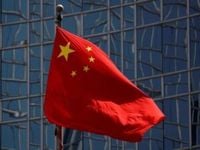On Monday, April 7, 2025, the China Nonferrous Metals Industry Association announced that the Chinese government's restrictions on exporting rare earth minerals will not significantly disrupt global supply chains. This declaration comes as a response to tariffs imposed on Chinese products by former U.S. President Donald Trump, which have heightened tensions between the two economic powers.
China, the largest global producer and exporter of rare earth minerals, has taken a firm stance by implementing immediate export restrictions on seven types of these critical minerals. These minerals, which include tungsten, tellurium, bismuth, molybdenum, and indium, are essential for various industries, including technology and renewable energy. The association emphasized that these measures are intended to protect global security and peace, stating, "Unfair competitive practices against suppliers will not affect normal trade operations for companies that do not compromise China's security and development."
In recent years, concerns have grown in Washington regarding China's dominance in the rare earth market, especially following initial restrictions on gallium and germanium exports implemented last year. The U.S. has increasingly viewed these minerals as vital to national security and technological advancement, leading to a series of retaliatory measures from both sides.
According to Bloomberg, the restrictions on rare earth exports are framed as necessary for safeguarding China's national security and domestic interests. The announcement follows a significant escalation in trade tensions, with the U.S. imposing a 34% tariff on Chinese imports as part of its broader strategy to protect the American economy. This tariff, announced by Trump, is part of his administration's efforts to counter what he described as decades of economic exploitation by foreign nations.
In response to these tariffs, the China Nonferrous Metals Industry Association reassured global markets, asserting that the export restrictions would not undermine the stability and security of international supply chains. They stated, "These measures will not impact the stability and security of international supply or manufacturing," aiming to alleviate fears among businesses reliant on these minerals.
As the trade war intensifies, the implications for global supply chains become increasingly complex. The U.S. has accused China of engaging in unfair trade practices, while China has criticized the U.S. for its aggressive tariff policies. This tit-for-tat approach has left many companies in limbo, uncertain about future supply and pricing of essential materials.
Industry analysts express concern that these ongoing tensions could lead to increased prices and supply shortages for rare earth minerals, which are crucial for the production of high-tech products, electric vehicles, and renewable energy technologies. The situation highlights the strategic importance of these resources and the potential for further escalation in the trade conflict.
Moreover, the Chinese government's decision to impose these restrictions is seen as a strategic move to leverage its position in global markets. By controlling the supply of rare earth minerals, China can exert significant influence over industries that depend on these materials, particularly in the West.
The impact of these trade policies extends beyond just the immediate economic implications. As nations grapple with the challenges posed by shifting supply chains and geopolitical tensions, the need for diversification in sourcing rare earth minerals becomes increasingly apparent. Countries like the United States, Japan, and Australia are exploring ways to reduce their reliance on Chinese supplies, seeking to establish their own sources of these critical materials.
In the U.S., lawmakers are calling for a comprehensive strategy to secure access to rare earth minerals, emphasizing the importance of domestic production and partnerships with allied nations. This push for self-sufficiency reflects a growing recognition of the strategic vulnerabilities associated with over-reliance on a single source for essential resources.
As the global landscape continues to evolve, the dynamics of the rare earth market will play a crucial role in shaping economic relationships between nations. The ongoing trade war between the U.S. and China serves as a reminder of the interconnected nature of global supply chains and the potential for disruption in an increasingly polarized world.
In conclusion, the restrictions imposed by China on rare earth mineral exports represent a significant development in the ongoing trade conflict with the United States. While the China Nonferrous Metals Industry Association has sought to reassure global markets about the stability of supply chains, the reality remains that these tensions could lead to broader implications for industries reliant on these critical minerals. As both nations navigate this complex landscape, the future of global trade in rare earth minerals hangs in the balance.


